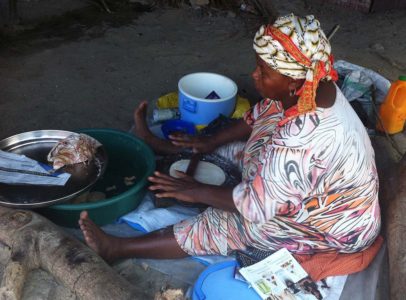
One can find her every morning from 06:30 preparing the ‘shop.’
Ladies run the businesses on the street, many of which are the cooking mamas who can be found at any stratigic open space with their charcoal stoves, pots and pans and tea thermoses.
Sometimes a small structure of rough poles and corrugated iron sheets provide the mamas with some shade and shelter.
From early morning on, they just squat and work away to make a day’s wage.
My favourite mama chapati has her business nestled between the mosque, fishermen and the beach.
One can find her every morning from 06:30 preparing the ‘shop’: sitting on the ground, keeping the coals glowing, rolling the dough and baking the chapati.
From early morning on there are customers usually waiting for an order of two, four or maybe just one chapati.
Bajaj and taxi drivers (even some private cars) roll up for an order — it’s take away.
One regular customer buys 10 every day to take to his colleagues at the office.
All in all it looks like a thriving business, amazingly so considering the conditions.
Sitting in the sand, chickens running around, flies to be waved away constantly and the art of preparing calmly and baking each chapati one by one as eager customers hover and ask tayari — ready?
She’ll be there selling as long as her stock lasts.
There’s also dada who cooks cassava under the same roof.
It’s a cumbersome and oily business in which chunks of peeled cassava are being deep fried.
They must be tested constantly to see if they’re cooked before finally being packed in old newspaper, ready for sale.
When cassava and dough have finished, the dishes are washed, all is cleared away and the sand is swept.
Nothing remains of the hustle of another day in Dar.
Like this? Read more on this topic: the hope of good sales.

